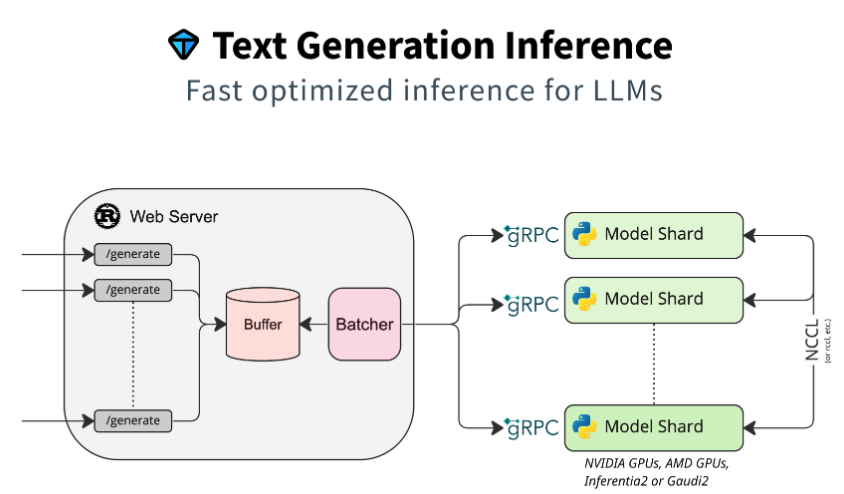使用Text Generation Inference运行大模型
📅 2024-11-04 | 🖱️
TGI简介 #
Text Generation Inference(TGI)是一个用于部署和提供大型语言模型(LLMs)服务的工具包。TGI支持高性能文本生成,适用于最受欢迎的开源大语言模型,包括Llama、Falcon、StarCoder、BLOOM、GPT-NeoX和T5。
TGI是一个基于 Rust、Python 和 gRPC 的文本生成推理服务器,已在Hugging Face的生产环境中使用,用于支持Hugging Chat、推理API和推理端点。

Text Generation Inference实现了多项优化和功能,例如:
- 简易启动器,支持大多数流行的大语言模型的服务
- 已适用于生产环境(支持 Open Telemetry 的分布式追踪和 Prometheus 指标)
- 使用张量并行加速多 GPU 的推理过程
- 基于服务器发送事件(SSE)的 Token 流式传输
- 持续批处理传入请求,提高整体吞吐量
- 针对推理优化的 Transformers 代码,支持在最常用架构上应用Flash Attention和Paged Attention
- 通过bitsandbytes和GPT-Q进行量化
- 支持Safetensors格式的权重加载
- 使用“大语言模型水印(A Watermark for Large Language Models)”功能进行水印嵌入
- Logits 参数调节((temperature scaling, top-p, top-k, repetition penalty)
- 停止序列
- Log概率记录
- 微调支持:使用微调模型执行特定任务,以获得更高的准确性和性能。
- 指导功能(Guidance):强制模型生成基于用户自定义输出结构的结构化输出,实现函数调用和工具使用。
Text Generation Inference 已被多个项目用于生产环境,例如:
- Hugging Chat:一个支持开放模型访问的开源界面,如 Open Assistant 和 Llama
- OpenAssistant:一个开源社区项目,致力于在公开环境中训练大语言模型
- nat.dev:一个用于探索和比较大语言模型的实验平台。
TGI支持的模型 #
Text Generation Inference支持优化模型的服务。Supported Models中列出了支持的模型(VLMs & LLMs)。
本地安装和运行 #
不建议从源代码安装TGI。而是推荐通过Docker使用TGI。
本地安装 #
可以选择在本地安装TGI。
首先安装 Rust,可参考“安装Rust”。
创建一个Python虚拟环境(至少使用Python 3.9):
1python3.11 -m venv text-generation-inference
2source text-generation-inference/bin/activate
安装protoc:
1PROTOC_ZIP=protoc-21.12-linux-x86_64.zip
2curl -OL https://github.com/protocolbuffers/protobuf/releases/download/v21.12/$PROTOC_ZIP
3sudo unzip -o $PROTOC_ZIP -d /usr/local bin/protoc
4sudo unzip -o $PROTOC_ZIP -d /usr/local 'include/*'
5rm -f $PROTOC_ZIP
接下来从源码编译安装TGI:
1cd text-generation-inference
2git clone https://github.com/huggingface/text-generation-inference.git
3cd text-generation-inference
4# 将使用tag v2.4.0构建
5git checkout -b tobuild v2.4.0
6
7export PIP_INDEX_URL=https://mirrors.aliyun.com/pypi/simple
8BUILD_EXTENSIONS=True make install -j 4
注意
在某些机器上,可能还需要安装编译和构建的工具:
1sudo apt-get install libssl-dev gcc 2sudo apt install cmake
编译安装后,会在~/.cargo/bin目录下安装text-generation-launcher和text-generation-router两个二进制文件。
1text-generation-launcher --version
2text-generation-launcher 2.4.0
运行模型 #
下面讲使用text-generation-launcher运行模型,注意使用text-generation-launcher命令前,需要确保前面创建的python虚拟环境text-generation-inference处于激活状态。
这里使用Qwen/Qwen2.5-7B-Instruct(模型已经预先下载好):
1export PYTORCH_CUDA_ALLOC_CONF=expandable_segments:True
2export HF_HUB_OFFLINE=1
3
4
5text-generation-launcher --model-id Qwen/Qwen2.5-7B-Instruct \
6 --max-total-tokens=32768 \
7 --max-input-tokens=32767 \
8 --port 8000
9
10# text-generation-launcher --model-id Qwen/Qwen2.5-7B-Instruct \
11# --max-total-tokens=16384 \
12# --max-input-tokens=16383 \
13# --port 8000
上面的命令报了ModuleNotFoundError: No module named 'dropout_layer_norm'的错误,根据issues 1961中的内容,安装CUDA扩展layer_norm,具体链接https://github.com/Dao-AILab/flash-attention/tree/main/csrc/layer_norm。
安装后启动正常。
启动服务器后,可以通过请求来使用生成接口/generate或兼容OpenAI Chat Completion API的消息API/v1/chat/completions。有关API的更多信息,请查阅 text-generation-inference的OpenAPI文档。
1curl -s localhost:8000/v1/models | jq .
2
3{
4 "object": "list",
5 "data": [
6 {
7 "id": "Qwen/Qwen2.5-7B-Instruct",
8 "object": "model",
9 "created": 0,
10 "owned_by": "Qwen/Qwen2.5-7B-Instruct"
11 }
12 ]
13}
1curl -s http://localhost:8000/v1/chat/completions -H "Content-Type: application/json" -d '{
2 "model": "Qwen/Qwen2.5-7B-Instruct",
3 "messages": [
4 {"role": "system", "content": "你是一个数学家."},
5 {"role": "user", "content": "9.11和9.8这两个小数谁比较大?"}
6 ],
7 "max_tokens": 512
8}' | jq '.choices[0].message.content'
9
10"比较9.11和9.8这两个小数时,可以从整数部分和小数部分依次比较。\n\n1. 首先比较整数部分:9和9,两者相同。\n2. 然后比较小数部分的第一位:1和8。这里的1小于8,因此9.11小于9.8。\n\n因此,9.8比9.11大。"
1curl -s http://localhost:8000/v1/chat/completions -H "Content-Type: application/json" -d '{
2 "model": "Qwen/Qwen2.5-7B-Instruct",
3 "messages": [
4 { "role": "user", "content": "What is 3 * 12? Also, what is 11 + 49?" }
5 ],
6 "parallel_tool_calls": false,
7 "tools": [
8 {
9 "type": "function",
10 "function": {
11 "name": "add",
12 "description": "Add two integers.",
13 "parameters": {
14 "type": "object",
15 "properties": {
16 "a": {"type": "integer"},
17 "b": {"type": "integer"}
18 },
19 "required": ["a", "b"]
20 }
21 }
22 },
23 {
24 "type": "function",
25 "function": {
26 "name": "multiply",
27 "description": "Multiply two integers.",
28 "parameters": {
29 "type": "object",
30 "properties": {
31 "a": {"type": "integer"},
32 "b": {"type": "integer"}
33 },
34 "required": ["a", "b"]
35 }
36 }
37 }
38 ]
39}' | jq '.choices[0].message.tool_calls'
容器化运行TGI #
不建议从源代码安装TGI。而是推荐通过Docker使用TGI。
这里在TGI容器中运行Qwen/Qwen2.5-7B-Instruct(模型已经预先下载好):
1model=Qwen/Qwen2.5-7B-Instruct
2volume=$HOME/.cache/huggingface # share a volume with the Docker container to avoid downloading weights every run
3
4sudo docker run --name tgi --restart=unless-stopped -d --gpus all --shm-size 2g -p 8000:80 -v $volume:/data \
5 -e HF_HUB_OFFLINE=1 \
6 ghcr.io/huggingface/text-generation-inference:2.4.0 \
7 --max-total-tokens=32768 \
8 --max-input-tokens=32767 \
9 --model-id $model
10
11
12# sudo docker run --name tgi --restart=unless-stopped -d --gpus all --shm-size 2g -p 8000:80 -v $volume:/data \
13# -e HF_HUB_OFFLINE=1 \
14# ghcr.io/huggingface/text-generation-inference:2.4.0 \
15# --max-total-tokens=16384 \
16# --max-input-tokens=16383 \
17# --model-id $model